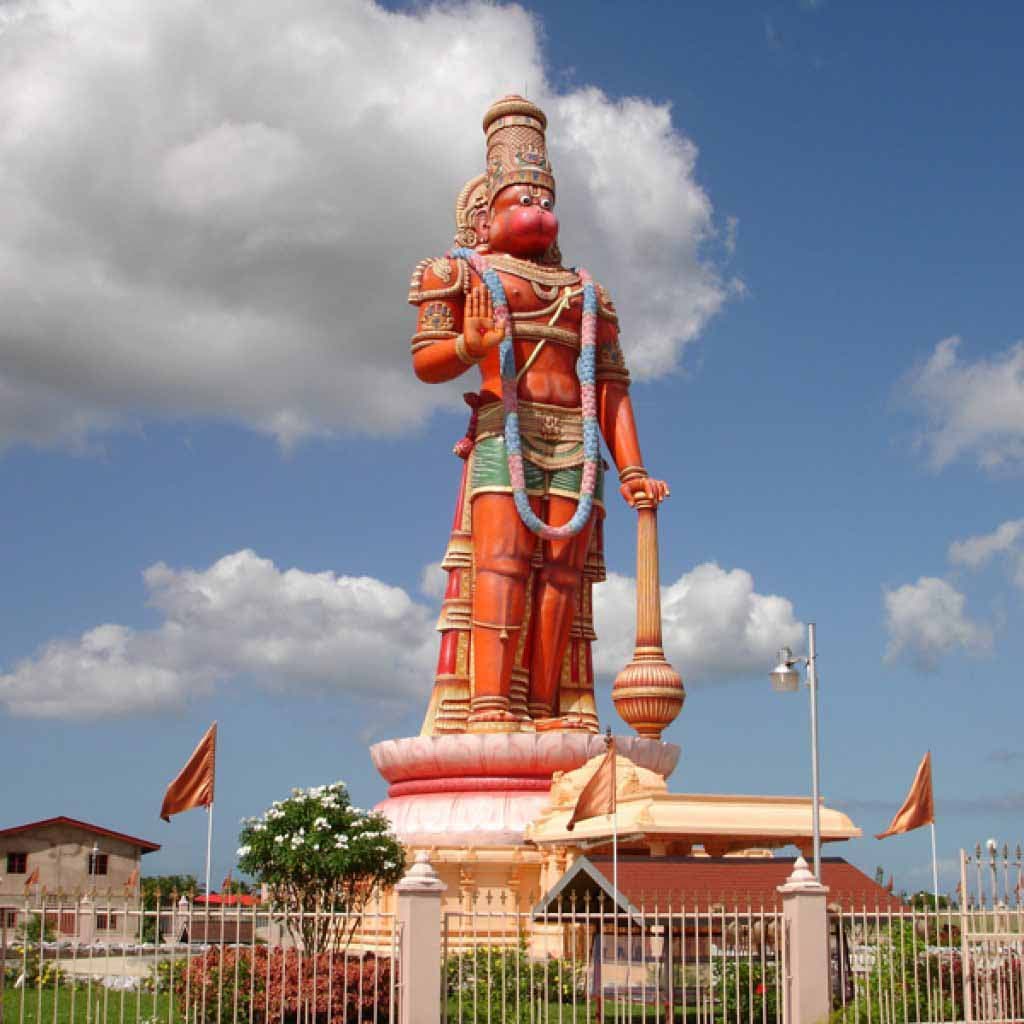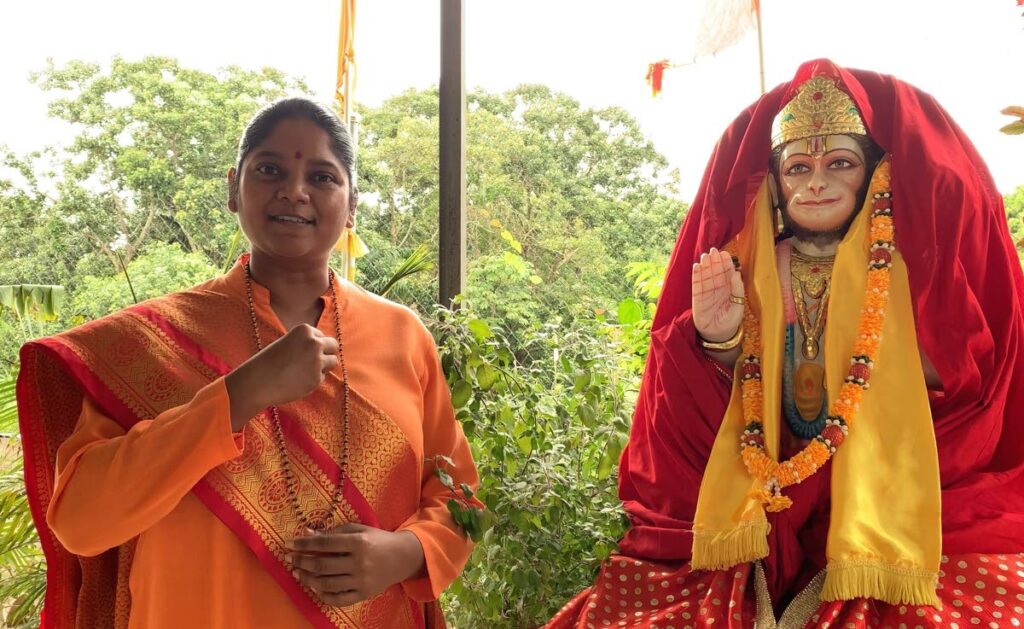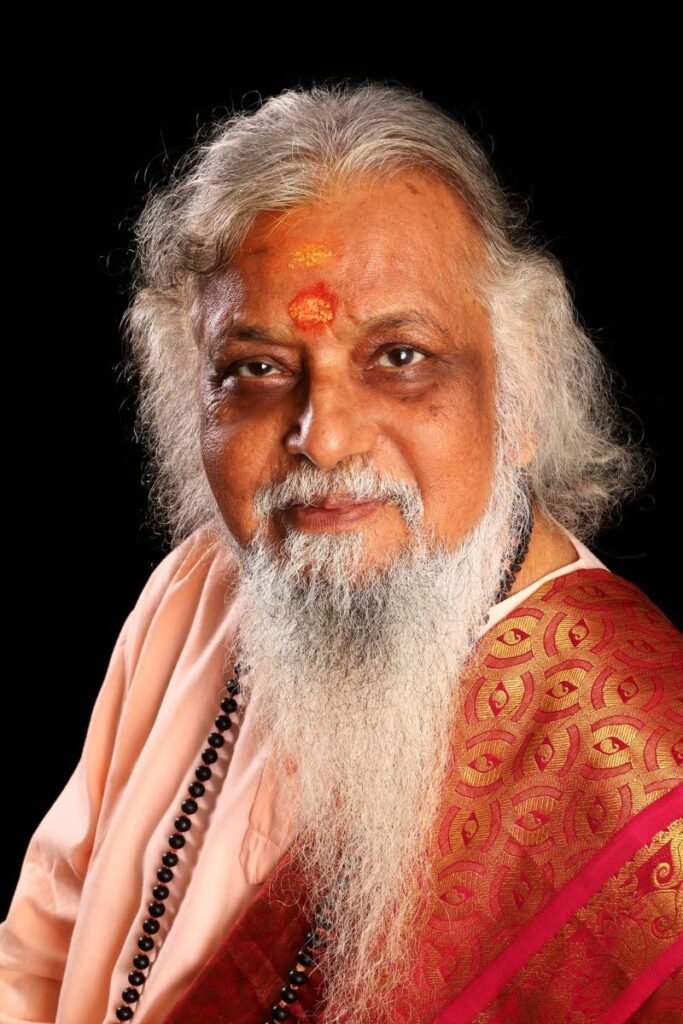Hindus celebrate Hanuman Jayanti

BAVINA SOOKDEO
Hanuman Jayanti is a Hindu festival that celebrates Lord Hanuman's birth anniversary. According to the Hindu calendar, Hanuman Jayanti is observed on the full moon day of the Chaitra month. This usually occurs in the months of March and/or April on the Gregorian calendar. This year, Hanuman Jayanti will be celebrated on April 5.
Lord Hanuman is said to have been born at Chaitra Purnima (the first full moon after the start of the New Year).
Hindus think Shri Hanumanji (as Lord Hanuman is referred to) is an ideal personality for humanity to emulate.
“Humanity is complete and perfect if harmony exists among us,” said Swami Brahmaswarupananda, founder of the Brahma Vidya Peetham International.
“Humanity will flourish when every individual has strength in their body, love in their heart and knowledge in their head. The synthesis of these three qualities will allow humanity to blossom with peace, love, truth and compassion.
"As an ideal personality, Shri Hanumanji embodies all these characteristics and much more. Hanumanji accepts the entire world as one family and envisions the entire cosmos as his life, the omnipotent, omnipresent, supreme Brahman.”

In an interview with Newsday, Swami Brahmaswarupananda and Sadhvi Anandaji, general secretary of Brahma Vidya Peetham International, explained the meaning of Hanuman.
“Sri Hanumanji’s name alone holds great significance. ‘Hanu’ in Sanskrit means to destroy, while ‘man’ represents ego or the desire for respect, so the name Hanuman signifies the destruction of ego.
"In the Vedas, Shri Hanumanji symbolises the divine sound of Aum. His representation of Aum can be found in the Varn Bijkosh book where each syllable of Aum corresponds to a syllable of the name Hanuman.
"‘Ha’ symbolises the syllable ‘a’ of Aum and Lord Vishnu, ‘nu’ represents the ‘u’ syllable of Aum and Lord Shiva, ‘ma’ represents the ‘m’ syllable and Lord Brahma and ‘na’ represents the nasal sound of Aum (depicted by the bindu or dot in Hindi Aum symbol).
"In the Vedas, Shri Hanumanji and Aum are equal thus making Hanumanji the embodiment of the universal sound – Aum.”
Questioned on the Hanuman Chalisa (40 verses in reverence to Lord Hanuman) and the meaning of the words asht siddi the Swami said, “Ability to earn supernatural powers and unusual skills or powers is known as siddhi. There are eight primary siddhis. Nothing is impossible for the one who attains these eight siddhis.

In the holy Hindu scripture (Ramayan) it is stated that Shri Hanumanji went to Lanka to meet Mother Sita. She blessed Shri Hanumanji stating, “You will be the giver of eight fold supernatural power of Yogis, (ashta siddhi) and nine kinds of wealth of Kuber (God of wealth) (
nav niddhi). The eight siddhis are Anima (to assume a minute form), Mahima (to become large), Garima (the capability to make one’s body heavy), Laghima (ability to make oneself light as a feather), Praptih (to attain what we want), Praakamya (the ability to go anywhere in the universe), Isitva (to rule over the entire universe), Vasitva (power of supremacy to make others follow you).”
Pujya Sri Ganapathy Sachchidananda Swamiji, with over 15 Vedic scholars from India, has organised a big yajna (prayer ceremony) with sacred Vedic chanting, Hanuman Abhisheka (symbolic offering attributed to purification), Chalisa and prayer to 85-foot Karya Siddhi Hanumanji Murti at the Dattatreya Yoga Centre, Carapiachaima Wednesday.
Hanuman is worshipped as a deity with immense strength, dedication and the ability to gain victory over evil and provide protection. On this occasion, all organisations and temples from cities to villages, including Sanatan Dharma Maha Sabha, SWAHA, Chinmaya Mission and Brahma Vidya Peetham International. Every devotee is extending sincere and devoted prayers to Sri Hanumanji for individual and collective blessings.

Comments
"Hindus celebrate Hanuman Jayanti"